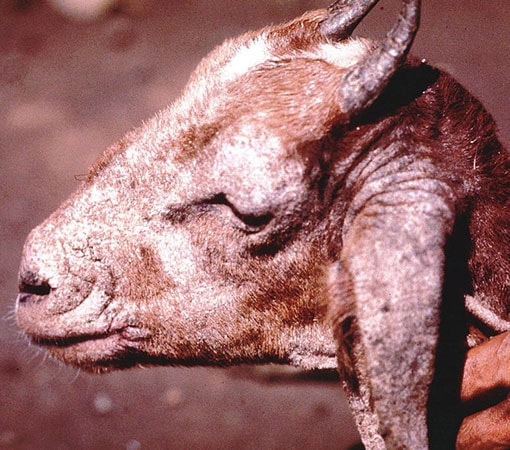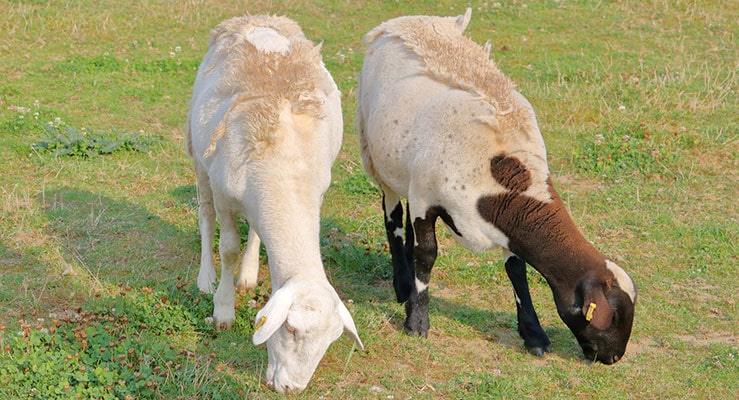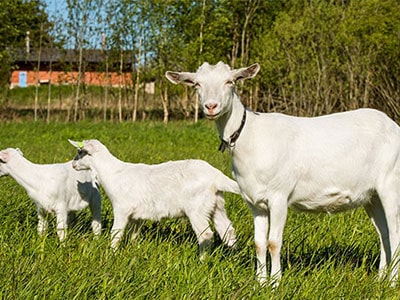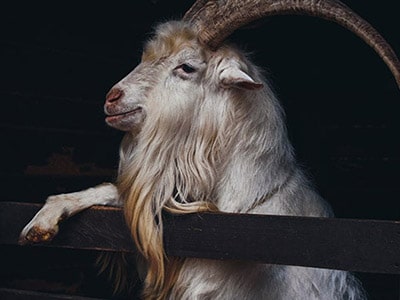Are your goats shedding their hair and don't know whether this is due to a normal cause or a disease? Here are several reasons why goats are losing their hair.
Goats were among the first domesticated animals and raised for their milk, meat, and hair for more than 10.000 years. With time, by crossing certain breeds and through selective breeding, more small-size goat breeds have emerged, making them perfect for companionship.
Nowadays, goats represent more than a food source. Due to their intelligence and funny way of being, goats are also kept as family pets in many households.
Just like all animals, goats can undergo various conditions or be affected by harmful parasites or viruses that provoke changes both in their behavior and in their appearance. These include hair loss, or as it is scientifically called, "alopecia".
When a goat loses its hair excessively, it can be a sign that something is happening to the animal. In general, it is either the result of the action of a parasite or a disease.
So, next, we will talk about the most common causes for which a goat can lose all or part of its hair.
1. Seasonal Shedding
The most common and least worrying cause for hair loss in goats is seasonal shedding.
Most goat breeds grow thick coats to prepare for harsh winters and change their hair when the warm months arrive.
It is important to know that not all goat breeds shed the same way. The period when this happens can also differ from year to year and from one climate to another. This process can even vary from one goat to another.
One goat can drastically lose almost all its hair in a year, while the next season may only get a few small bald spots here and there or only a bit of dandruff.
But how do you know when a goat's hair loss is due to natural factors? This is the great uncertainty of many new goat owners and that's when many are panicking.
Firstly, the shedding of goats is regularly seen in the spring. If you notice that your animals are shedding their hair during the winter when it's still cold, there might be another explanation for the problem.
If the hair loss is accompanied by other symptoms, then it may no longer be a seasonal shedding. These include:
- Excessive scratching
- The appearance of spots on the skin
- Observation of external parasites
- Behavioral changes
2. Lack Of Vitamins And Minerals
The hair loss in goats might also happen when particular vitamins and minerals lacking from their diet. This problem often occurs in winter, when the diet of many goats consists exclusively of hay. A varied diet that includes vitamins and minerals is very important for the health of goats all year long.
The most common mineral deficiency responsible for hair loss in goats is Zinc. Zinc an essential mineral in humans and animals and plays a crucial role in the functions of the immune system, cell division, wound healing, and more.
Insufficiency of this mineral is often difficult to detect until it reaches a very low level.
Zinc deficiency in goats is usually characterized by stiff limbs, flaky skin, low appetite, excessive salivation, swollen limbs, and deformation of the hooves. Additionally, a more visible sign that can indicate this problem is hair shedding.
So, when it's not the shedding season and your goats start to lose large chunks of hair, you may want to consider a Zinc deficiency. [1]
Although this deficiency can be simply caused by an unbalanced diet, zinc insufficiency is often only a side effect of a diet that contains too much calcium.
Many goat owners frequently give calcium supplements to lactating or pregnant goats. Studies have shown that elevated levels of dietary calcium can reduce zinc absorption in animals. [2]
Most of the time, zinc insufficiency can be corrected by giving adding zinc supplements to the diet of goats, or by simply eliminating the excess calcium, when that is the cause.
3. Diseases And Parasites
Goat hair loss can also be caused by several diseases or as a result of a parasite infestation.
Lice
Lice are among the most common parasites that attack goats and which can cause alopecia. These farm animals are typically parasitized either by chewing lice (who feed with skin debris, hair, and surface secretions) or blood-sucking lice (who feed with the blood of their host). Goat lice do not attack humans. They are host specific and may only affect goats and their close relatives, such as sheep. [3]
While lice only rarely directly cause severe hair loss in goats, most of the shedding is due to the fact that the animals constantly rub against the fences and objects around them to get rid of the discomfort caused by the parasites. This often leads to skin irritation, excoriations, and eventually to entirely bald areas in the coats of goats.
Mange
Another parasitic infection that may cause hair shedding in goats is mange. Mange is fairly common in goats and since it is highly contagious it can infect entire herds pretty fast.
This condition can be of several types, depending on the species of mites infecting the host. Typically, the mites attacking goats are: [4]
- Sarcoptic (S scabiei var caprae)
- Psoroptic (ear mange, caused by P cuniculi)
- Chorioptic (Chorioptes bovis)
- Demodectic (D caprae)
Although symptoms differ depending on the type of mange, the main signs of this parasitic infection include excessive scratching, coat damage and hair shedding, restlessness, fatigue, reduced growth rates in kids, scabby flaky skin, and irritations. [5]

Mange in goats is curable, but a veterinarian is required to identify exactly the cause of the disease and its type before administrating a treatment. This may vary based on the severity, age of the animals, as well as other factors.
4. Hormonal Changes During Pregnancy
Another period when your goats may be shedding hair is during pregnancy. In goats, as well as in humans or other animals, throughout pregnancy, their body undergoes a series of physiological and hormonal changes. While this is not a rule of thumb for all does, these hormonal imbalances can in some cases produce hair shedding.
Hair loss during pregnancy is not specific to goats, it is also an event experienced by many other mammals, including women. However, as mentioned earlier, it is not a general rule. While some women experience increased hair shedding during pregnancy, some say that their hair looks better than ever. [6]
Moreover, the lactation period can also drain females of calcium and other minerals needed for a healthy coat, resulting in excessive hair shedding.
5. Stress, Wounds, Or Self-Inflicted Trauma
Besides the problems we talked about earlier in this article, there are also additional causes that can lead to hair loss in goats.
Stress
Like humans, animals can experience periods of high levels of stress. A few examples of experiences that can be stressful for goats are:
- Transporting
- Separation from their families
- Moving to unknown places
- Extreme heat, cold, thunderstorms, etc.
- Prolonged exposure to loud noises
Stress not only is not good for animals' health but can also be reflected in the quality of their coat. Consequently, when goats are exposed to long periods of stress, the first signs may become visible through hair shedding.
Wounds
When goats are grazing, it is quite easy for them to suffer minor injuries or scratches. These wounds can also be caused by fights with other goats or by predators.
After they heal, the goats may be left with spots where their hair no longer grows. So you may not notice initially the wound, but see only a bald patch after it heals.
Self-Inflicted Trauma
Some animals may lose part of their fur as a result of self-inflicted trauma. An example may be when animals rub too much on fences or other objects around them and cause skin irritation or injuries. Usually, when this happens, the animals are either kept in very small spaces or suffer from a skin disease or a parasitic infection.
Final Word
These are some of the most common reasons for goats shedding their hair. While some are normal, some can be the symptoms of several diseases and parasitic infections.
If your goats are losing their hair and you are unable to find the reason in one of the ones mentioned in this article, you may need to ask the opinion of a veterinarian. In some cases, blood samples may be needed to detect certain diseases or internal parasites.
Resources:



